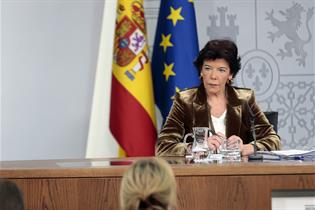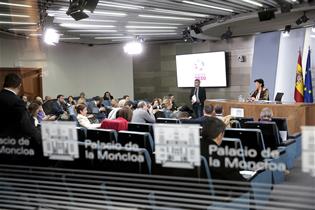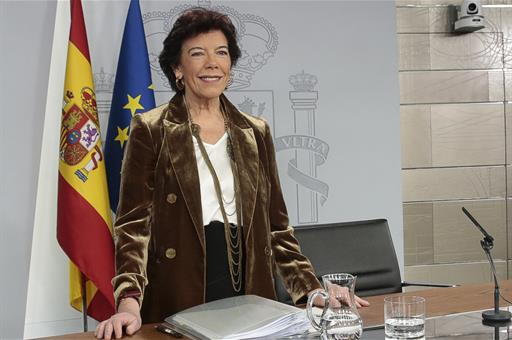Council of Ministers
Government approves National Programme to Resettle Refugees 2019
Council of Ministers - 2019.12.20
Moncloa Palace, Madrid
The Council of Ministers approved the National Programme to Resettle Refugees in Spain 2019 to be implemented in 2020. Resettlement is the process whereby a refugee that has fled their country of origin due to persecution on grounds of race, religion, political opinions or other grounds and who enjoys temporary asylum in another country, can be resettled in a third country, in this case Spain.
The Acting Minister for Education and Vocational Training and Government Spokesperson, Isabel Celaá, claimed that Spain, in line with its European commitments, will take in 1,200 refugees over the course of 2020.
Through this programme, Spain will remain committed to resettlement with the aim of cooperating with countries which, due to their proximity to conflict zones, receive huge flows of refugees. In this regard, Isabel Celaá declared that the measure contributes to alleviating the humanitarian crisis in the East Mediterranean.
Care for people with disabilities
 Pool Moncloa / JM CuadradoThe government agreed to improve the care for people with disabilities and other groups in particularly vulnerable situations in disasters.
Pool Moncloa / JM CuadradoThe government agreed to improve the care for people with disabilities and other groups in particularly vulnerable situations in disasters.
Isabel Celaá explained that the measure means that, when faced with a disaster or an emergency, people with disabilities will receive clear information and may be cared for according to their disability to guarantee their safety.
For example, the rule lays the foundations for overcoming communication barriers faced by deaf people who use sign language when they call for an emergency service through the 112 hotline.
Subsidies for business innovation
The government authorised the Centre for Industrial Technological Development (Spanish acronym: CEDETI) to call a round of proposals for subsidies corresponding to 2019, for the sum of 70 million euros.
The aim is to finance large R&D business projects geared towards resolving important challenges facing society, entitled 'Misiones CDTI' [CITD Missions]. Isabel Celaá specified that large strategic research and development initiatives related to universities, technology centre and research bodies will be supported. She also stressed that these subsidies are in line with such government goals as the mitigation of carbon emissions.
Payment services
The government has development the regulation of the legal regime on payment institutions and services. The new legal framework strengthens security and guarantee protection for users when employing the different formulas for payment (telephone, QR codes, cards, etc.).
The Acting Government Spokesperson announced that a ministerial order will be improved in the coming days to complete the transposition of the EU Directive on payment services, known as PSD2.
Fight against trafficking of women and girls for purpose of sexual exploitation
The Council of Ministers analysed the 4th report monitoring the Comprehensive Plan to fight the trafficking of women and girls for the purpose of sexual exploitation, which reflects the figures for 2018.
The text shows that 13,317 women were attended to. In addition, 2,036 administrative inspections were performed in locations where prostitution takes place, where 9,315 people were identified as in an at risk situation. 91 cases were also investigated of trafficking for the purpose of sexual exploitation.
The Acting Government Spokesperson stated that it is necessary to continue raising awareness in society regarding this matter.
Other agreements
The government authorised the direct granting of a subsidy worth 8 million euros to the Regional Government of the Canary Islands to finance the functioning of water purification plants.
The government also granted a State guarantee for the exhibition entitled "Rembrandt and the portrait in Amsterdam 1590-1670", which will be on display in the Thyssen-Bornemisza National Museum from 18 February to 24 May 2020.
At a cultural level, 24 leading figures from the world of culture have been granted the Gold Medal for Merit in the Fine Arts 2019.
Weekly assessment and current affairs
 Pool Moncloa / JM CuadradoIsabel Celaá began her assessment of the week's current affairs by expressing her regret over the deaths of three people from the storms in Asturias, Galicia and Castile and Leon.
Pool Moncloa / JM CuadradoIsabel Celaá began her assessment of the week's current affairs by expressing her regret over the deaths of three people from the storms in Asturias, Galicia and Castile and Leon.
Isabel Celaá also mentioned the round of contacts maintained since Monday by the Acting President of the Government and candidate for the investiture, Pedro Sánchez, with the leaders of the PP and Ciudadanos, the regional presidents, the President of the Spanish Federation of Municipalities and Provinces and social stakeholders.
The Acting Government Spokesperson stressed that Pedro Sánchez has proposed to all these parties "a scenario of dialogue and détente" to build a new era of negotiation and consensus between all the political players, with the aim of "installing a government as soon as possible".
Isabel Celaá emphasised that the caretaker government does not renounce achieving the investiture of Pedro Sánchez before the end of the year and that it wishes to avoid a third round of general elections being called.
Furthermore, when asked about the potential repercussions on the negotiation of the investiture of the recent ruling from the European Court of Justice on the immunity of the Esquerra Republicana de Catalunya politician, Oriol Junqueras, Isabel Celaá stated that "politics and justice take separate paths, must belong to different lines and must substantiate their problems with different formulas".
The Acting Government Spokesperson backed the separation of powers and judicial independence, criticised the attempt "to channel political problems through the legal system, and vice versa", and advocated the government "continuing in political negotiations within the framework of the law".
Non official translation





